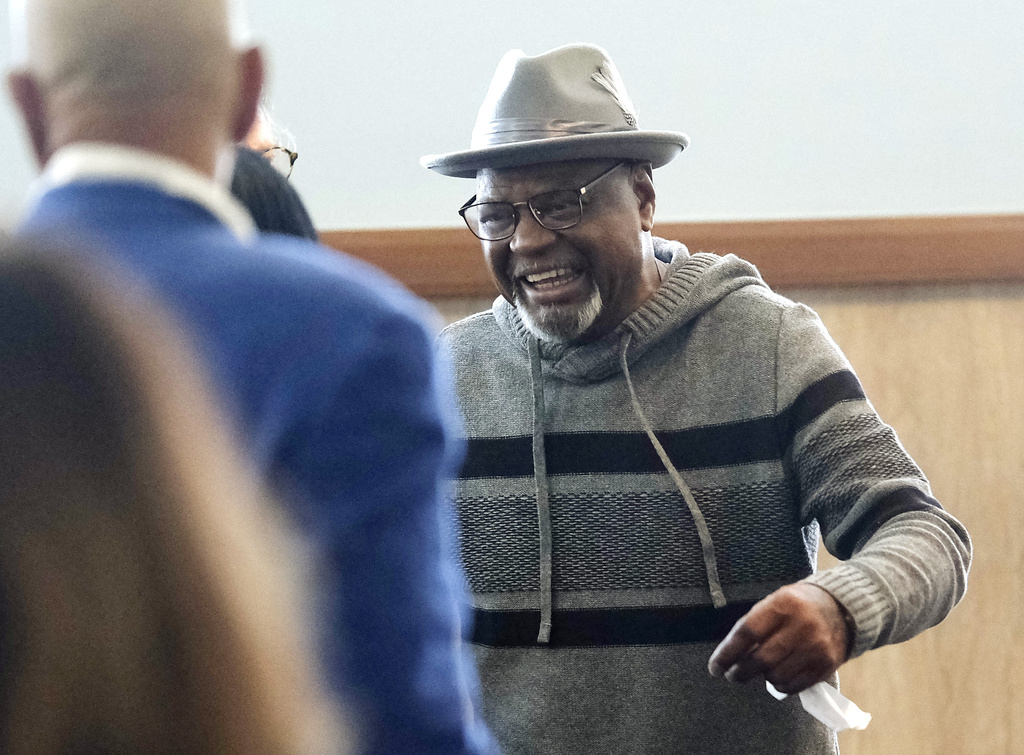An Oklahoma man has been formally declared innocent after spending the longest amount of time in prison of anyone who has been wrongfully convicted in U.S. history.
Glynn Simmons has always maintained his innocence in the 1974 murder case of Carolyn Sue Rogers, but on July 20, a judge finally listened, vacating the 70-year-old's conviction and ordering him a new trial after determining prosecutors withheld evidence.
After Simmons had been out on bond for two months, the same judge, Amy Palumbo, granted a motion filed by Oklahoma County District Attorney Vicki Behenna to dismiss the case, as Behenna said her office would not seek a retrial due to a lack of remaining evidence.
But those decisions were all based on legalities, not Simmons' actual noncommittal of the crime that put him in jail for decades. That lack of formal recognition pushed him to file a motion in October seeking a declaration of innocence, and to then seek compensation from the state of Oklahoma.
Palumbo ruled in favor of Simmons Tuesday, updating the conviction dismissal to a declaration of "actual innocence."
"This Court finds by clear and convincing evidence that the offense for which Mr. Simmons was convicted, sentenced and imprisoned in the case at hand, including any lesser included offenses, was not committed by Mr. Simmons," Palumbo said.

Simmons served 48 years, 1 month and 18 days after being convicted, putting him at the top of the time-spent-in-prison list of exonerees, according to data from the National Registry of Exonerations.
"It's a lesson in resilience and tenacity," Simmons said of the innocence ruling Tuesday, per the AP. "Don't let nobody tell you that (exoneration) can't happen, because it really can."
Rogers was 30 years old and working as a store clerk when two robbers entered and shot her in the head on Dec. 30, 1974. Another woman, Belinda Brown, who had entered the store was also shot in the head and survived.
Days after the robbery, Brown told police she wouldn't be able to identify anyone because her eyes were focused on the guns, not the people holding them, according to the Registry.
SEE MORE: Black man wrongly imprisoned for 16 years shot dead by Georgia deputy
However, after Brown viewed eight separate live lineups, police arrested 22-year-old Simmons and 21-year-old Don Roberts and charged them with capital murder.
During the trial, Brown said she had only identified the two during lineups, but she had actually identified four others, none of them being Simmons or Roberts, according to Simmons' attorney Joe Norwood.
Simmons testified during trial that he wasn't even in Oklahoma during the murder. He said he was actually in Harvey, Louisiana, playing pool that day and had never been to the state until coming there to stay with his aunt less than a week after. Multiple people testified to seeing him at the pool hall.
But on June 5, 1975, Simmons and Roberts were convicted and later sentenced to death. Their sentences were later modified to life in prison after the Supreme Court ruled the death penalty was unconstitutional due to unequal application.
Roberts was released on parole in 2008, according to the district attorney's office.
SEE MORE: The current state of the death penalty in the US
Scripps News Oklahoma reported Simmons came across life insurance money when his spouse passed away. He used this to hire a private investigator, who found key information helping the inmate's case, including the report that Brown had identified other suspects and that she had told prosecutors she was reconsidering who she identified in the lineups.
"One of those reports ended up being the basis for the conviction being vacated," Norwood said. "(It) showed that Glynn was not who this young lady picked out."
Now Simmons and his attorneys are hopeful to receive compensation for time served. Palumbo's ruling of innocence makes Simmons eligible for up to $175,000, plus he can file a federal lawsuit against Oklahoma City and the officials who were involved in his wrongful arrest and conviction, Norwood said Wednesday, per AP.
But as of now, he's living off donations while he undergoes treatment for stage 4 cancer, which was detected after his release.
"Glynn is having to live off of GoFundMe, that's literally how the man is surviving right now, paying rent, buying food," Norwood said. "Getting him compensation, and getting compensation is not for sure. (It's) in the future, and he has to sustain himself now."
If you'd like to donate to Simmons' GoFundMe to help him pay for personal and medical finances, click here.
Trending stories at Scrippsnews.com


